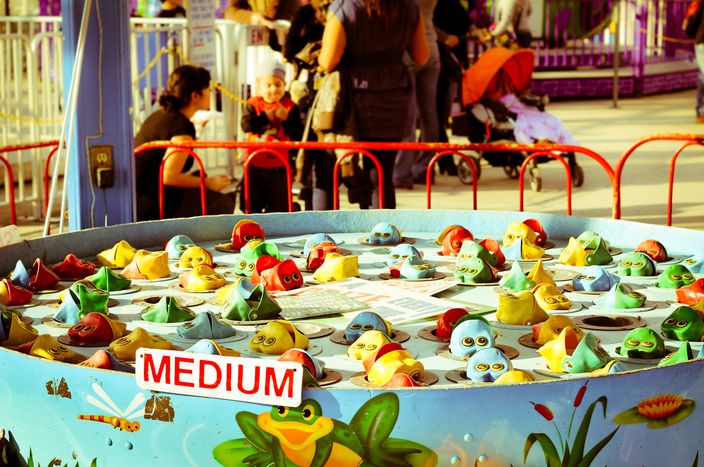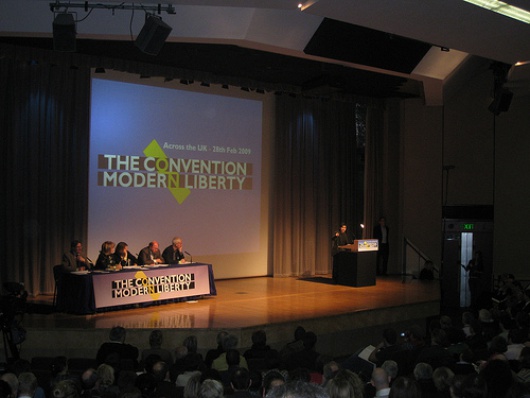
Convention on Modern Liberty: From the Frying Pan into the Fire?
Published on
by Sara Mojtehedzadeh
Frogs, quipped Shami Chakrabati. The erosion of liberty is like cooking frogs; put them in a boiling pot, they jump out. Slowly heat up the pan, they merrily bask in its warmth, blissfully unaware that they are being cooked alive.
The metaphor was an apt one.
Freedom and democracy are deeply entrenched elements of the West’s ideology and image; but our blithe confidence in our own accomplishments also numbs us to real abuses of power that occur with alarming frequency in the Western world.
 On February 28th, The Convention on Modern Liberty set out to expose these intrusions, armed with an impressive line up of public intellectuals such as Shami Chakrabati, director of the human rights advocacy group Liberty, and the LSE’s Mary Kaldor.
On February 28th, The Convention on Modern Liberty set out to expose these intrusions, armed with an impressive line up of public intellectuals such as Shami Chakrabati, director of the human rights advocacy group Liberty, and the LSE’s Mary Kaldor.
The cause was worthy, the timing impeccable; in the wake of the Bnyamin Mohammad scandal and with the spectre of ID cards and a ‘database state’ looming large in Britain, there is a special urgency to assessing the state of civil liberty in this country. Moazzem Begg’s sobering account of the torture and humiliation he suffered in Bagram and Guantanamo – with the full complicity of MI5 and MI6 – illustrated the ease with which governments contravene their commitments to fundamental freedoms. But as the list of state transgressions snowballed throughout the day, it was easy to feel disempowered and disenfranchised. Was Liberty to henceforth refer solely to a certain bourgeois shopping establishment? Had it forever lost its true meaning in British society?
Luckily, Brian Eno had an answer. The 70’s prog rock star/social activist wisely advised the 1,500 individuals in attendance to harness their ‘social creativity’ and engage in unrestrained public discussion to forge a more just political order.
Unfortunately, for all its worthy talk of creativity and innovation, the convention fell short on both of those counts. To start, its implicit definition of ‘liberty’ was narrow and limited. Indeed, the fact that there was no explicit debate in the plenary sessions about liberty actually means was troubling. The conference would have benefitted from a healthy discussion about the complex nature of liberty, rather than naively assuming that its definition is an uncontentious issue. Can liberty mean different things to different people? Is there no room for cultural, geographical, or gender specificity in the debate?
Moreover, the event focused overwhelmingly focused on individual civil freedoms with no discussion of their relation to other kinds of rights – collective, social, economic, cultural. But it seems problematic to assume that protection of individual rights alone will be enough to end discrimination against, say, British Muslims, and to create a more inclusive polity. What if liberalism, with its tradition of privileging of individual over collective rights, is part of the problem rather than its solution?
The event concluded on a disappointing note with Observer columnist Will Hutton declaring Islam to be part of the ‘problem’ and an unnatural ‘partner for liberty’. We must, he urged, keep arguing until ‘they have an Enlightenment’. If we want to take Brian Eno’s advice and enhance our social creativity as a means of solving Britain’s modern crises, perhaps we should move beyond the superficial and arcane framing of Islam as a ‘problem’. Hutton’s shallow conception of Islam ignores the way that a vast range of Islamic scholars, clerics, activists, lawyers, and feminists in the Middle East have, for centuries, sought to reform and revitalize their religion in the hopes of creating more just and inclusive societies. For all these criticisms, drawing attention to the abuses of power that too often go unnoticed in Britain is a worthy project. The convention certainly exposed its attendees to a massive arsenal of resources that they can now use to research their fundamental rights and how they have been violated. But without a more nuanced and critical analysis of what liberty truly means, perhaps we are merely jumping from the frying pan into the fire.



